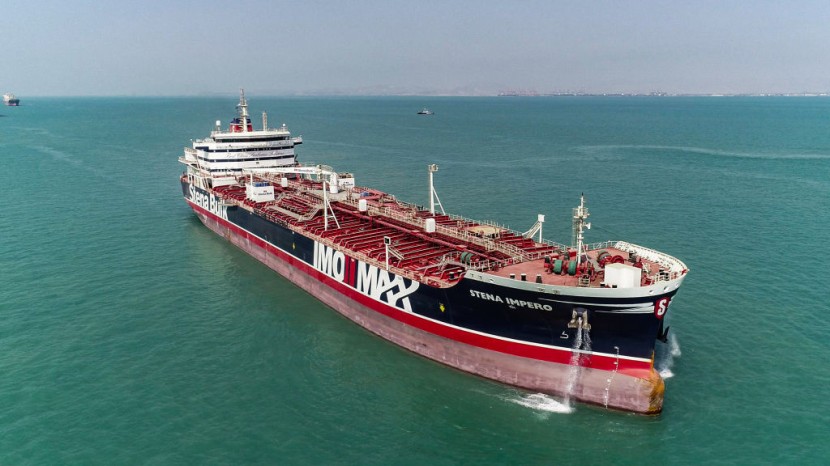
Empire Navigation, a Greek shipping company, pleaded guilty to smuggling sanctioned Iranian crude oil and agreed to pay a $2.4 million fine, according to newly unsealed US court documents.
This revelation sheds light on the illicit world of Iranian crude oil smuggling, heightening concerns regarding the ongoing sanctions and the escalating tensions between the United States and Iran.
Greek Shipping Company Guilty in Iranian Oil Smuggling, Fined $2.4M
The case against Empire Navigation, which has now been made public, represents the first admission by US prosecutors that the United States seized approximately one million barrels of oil from the tanker Suez Rajan. Under the plea agreement, Empire Navigation will serve a three-year probation, highlighting the gravity of the sanctions violations.
Per The Hill, this case has brought to light the clandestine world of Iranian crude oil smuggling, which has flourished despite Western sanctions, especially since the collapse of the 2015 nuclear agreement.
It has also contributed to escalating tensions between Washington and Tehran, even as both nations engage in negotiations involving suspended Iranian assets in South Korea and the release of five Iranian Americans held in Tehran. Since 2019, the United States and its allies have been actively seizing Iranian crude cargoes, which has led to a series of Iranian-attributed attacks in the Middle East, according to The Independent.
These actions have also resulted in retaliatory ship seizures by Iranian military and paramilitary forces, posing a significant threat to global shipping, mainly through the Strait of Hormuz, a vital passageway in the Persian Gulf that facilitates the transit of about 20% of the world's oil.
In February 2022, the organization United Against Nuclear Iran raised suspicions that the Suez Rajan tanker was transporting oil from Iran's Khargh Island, a significant oil distribution terminal in the Persian Gulf.
The Associated Press analysis of satellite imagery and shipping data at the time supported these allegations. Using satellite images and official documents, newly unsealed court documents illustrate how the Suez Rajan attempted to conceal its loading of Iranian crude oil onto one tanker by falsely asserting that the oil originated from another source.
The ship was stationed in the South China Sea off the northeast coast of Singapore for several months before abruptly and without explanation departing for the Texas coastline. Later, the vessel transferred its cargo to a different tanker, which discharged the crude in Houston. The unsealed court documents confirm that the US government confiscated the crude.
A counsel for Empire Navigation, Apostolos Tourkantonis, pleaded guilty to a single count of violating Iran sanctions. The Athens, Greece-based headquarters of Empire did not immediately respond to inquiries regarding the case.
The US Treasury has asserted that Iranian crude smuggling funds the Quds Force, a Revolutionary Guard expeditionary unit that operates throughout the Middle East. Numerous vessels attempting to conceal their movements and ownership through foreign shell corporations are believed to be aided by the Revolutionary Guard.
Per ABC News, the case involving the Suez Rajan is unique because the tanker was owned by the Los Angeles-based private equity firm Oaktree Capital Management at the time of the transfer. This ownership structure likely afforded an advantage to American prosecutors in their pursuit of the case. Having sold the vessel to Empire in late May, Oaktree has repeatedly declined to comment on the matter.
Former US Ambassador Applauds Greek Shipping Company for Exiting Iranian Oil Trade
Former US ambassador to the United Nations under George W. Bush and current leader of United Against Nuclear Iran, Mark Wallace, praised Empire Navigation for granting the request. He described Iran's oil smuggling operations as "mob-like" and urged others to withdraw from the trade.
Wallace's remarks alluded to the difficulties and potential dangers faced by those involved in this illegal industry, although the court documents did not disclose the specific nature of these dangers.
The lengthy delay in unloading the Suez Rajan's cargo had not only become a political issue, but also aroused questions within the Biden administration. The ship remained anchored in the Gulf of Mexico for months, with some corporations reluctant to move forward due to concerns regarding potential Iranian threats.
Iran has seized two tankers near the Strait of Hormuz since the Suez Rajan set sail for the United States, including one carrying cargo for the significant US oil company Chevron Corp. In July, the head of the Revolutionary Guard's naval wing issued threats against anyone who attempted to unload the Suez Rajan; Iranian state media linked these threats to the fate of the seized cargo.
Iran has maintained its threats and fury over the oil seizure, even summoning a Swiss diplomat to Tehran. Since the 1979 US Embassy takeover and ensuing hostage crisis, Switzerland has represented US interests in Iran. The United States has increased its naval presence in the Middle East in response to the escalating tensions, including dispatching the troop-and-aircraft-carrying USS Bataan through the Strait of Hormuz.
There are also considerations regarding the deployment of military personnel on commercial vessels transiting the strait to prevent additional Iranian seizures.
In an update late Wednesday, the US issued a warning to shippers traveling through the Middle East, stating that "Commercial vessels transiting through the Persian Gulf, Strait of Hormuz, and the Gulf of Oman continue to be illegally boarded, detained, or seized by Iranian forces."
Kepler data indicates that Iranian oil exports have remained above 1 million barrels per day for most of this year despite American sanctions. May and June exports exceeded 1.5 million barrels per day, with August exports at 1.4 million barrels per day. China is believed to be a significant purchaser of Iranian oil, presumably benefiting from substantial price reductions.
Empire Navigation's guilty plea is a significant development in the fight against Iranian oil smuggling. Still, it also highlights the need for a comprehensive policy review to address the broader problem of ongoing violations and the proliferation of such activities involving hundreds of vessels.
© 2026 HNGN, All rights reserved. Do not reproduce without permission.








